#USCIS processing times
Explore tagged Tumblr posts
Text
Navigating Everlasting Unity: The USA Green Card through Marriage
Embark on a journey of love, commitment, and legal recognition with the USA Green Card through Marriage. This immigration avenue allows spouses of U.S. citizens to establish permanent residency and build a shared future in the United States. From the initial petition filing to the adjustment of status process, couples navigate the intricacies of this pathway, creating a foundation for enduring togetherness. Join us in exploring the steps and requirements that lead to the USA Green Card through Marriage, where love not only binds hearts but also bridges borders for a lasting union on American soil.
#Marriage based immigration#USA Green Card through Marriage#Spousal visa application#Permanent residency for spouses#Family-sponsored green card#Form I-130 petition#USCIS processing times#Adjustment of status#Conditional permanent residence#Marriage-based green card interview#Consular processing for spouse visa#Immigration through marital relationship#Marriage-based immigration benefits#Dual intent in immigration#Sponsorship for immigrant spouse#Marriage visa documentation#Legal requirements for spousal green card#Immigrant visa for spouse of U.S. citizen
2 notes
·
View notes
Text
QUESTION: How long should I expect USCIS to take to process my application?
By Ari Sauer, partner and immigration lawyer at the Siskind Susser Law Firm. Last updated: May 4, 2025 QUESTION: How long should I expect USCIS to take to process my application? THE IMMIGRATION ANSWER MAN: Different applications or petitions have different processing times based upon what form was filed, what preference category a petition is filed under, and which USCIS office is processing…
0 notes
Text

𝗨𝗦𝗖𝗜𝗦 𝗣𝗿𝗼𝗰𝗲𝘀𝘀𝗶𝗻𝗴 𝗧𝗶𝗺𝗲𝘀 𝗶𝗻 𝟮𝟬𝟮𝟰
As 2024 unfolds, U.S. Citizenship and Immigration Services (USCIS) processing times are experiencing mixed results, with several key improvements, but also some lingering setbacks. Overall, the year has seen an encouraging trend towards greater efficiency, with many forms benefiting from faster processing times. For a quick reference, here’s a summary of current processing times for key immigration forms (Family Based Applications) as of August 2024.
#rajulaw#immigration#immigrationattorney#usimmigration#legalsupport#immigrationlaw#greencard#immigrationconsultant#immigrationlawyer#us visa#uscis#immigration 2024#processing time#family based immigration#uscis processing#visa processing
0 notes
Text
USCIS Improvements Cut Naturalization Processing Time
USCIS is processing naturalization cases faster than they have in years, and the agency is managing to cut down on its naturalization backlog. Given the current average timing, eligible green card holders who applied early in the summer 2024 might be sworn in in time to vote in the upcoming November elections. Of course, field offices vary in processing times, but USCIS stated it was effectively…
#Biden administration#eligibility requirements#employment rates#federal grants#green cards#juries#median processing time#naturalization#tax revenue#U.S. passport#US Citizenship and Immigration Services#USCIS
0 notes
Note
How do you deal with the doomscrolling that says America is doomed? I’m in another country thousands of miles away and I still feel scared. Especially for my relatives living there. I don’t know how you cannot feel so hopeless. Do you have any idea how you be feeling okay?
Here's the thing.
I'm moving to another country far from all of my family and almost all of my friends.
I can't drive which is kinda a death sentence over there until I've learned.
I'm coming from Paris to most likely living in a suburban area and the thought alone scares me.
I'm poor by US standards because I've only had a French salary up until now and my savings will surely be eaten through quickly.
I won't be allowed to work/make money in the US or leave the US soil after I've gotten married. First I'll have to ask permission and then I'll have no guarantee how long I'll have to wait before I'm legally allowed to even look for a job.
And speaking of jobs, I worked as a translator to the French language up until now, a skill which is largely useless over there, so who knows if I'll find work and what it'll be.
And speaking of language, arguably that one's minor, but I dread the idea of every single person asking me "where I'm from" within 1 sentence I've spoken, because of the accent I have that I can't get rid of.
So in many ways, regardless of the election result, I wouldn't have been okay anyway. I'm gonna be entering hard mode pretty fucking hard anyway because of general circumstances and age-old US law. My doomscrolling these days is more about USCIS file processing times, what documents allow you to get a learner's permit, and apartment listings and street views of suburban "parks" that look nothing like parks.
But to me, that beats living in fear of another travel ban and crying at the airport every time I have to part from my partner. Maybe I'll regret it, and if so I'll just move back to France. But this decision isn't a fluke. I was well aware things weren't gonna be easy for me before anyone became aware of it.
77 notes
·
View notes
Note
Wonder if Sam will take his new legal American bride to Italy? He will be married, although unlike Caitriona's it will be a fake marriage, by 31 Dec. He needs the residency.
Dear Married Anon,
Three possibilities on this one: a) you watched 90 Days Fiancé for way too long and with no attention to details; b) you think I am an idiot, with no legal knowledge or experience; c) you are an idiot, with no legal knowledge or experience.
Your question comes with two strong biases, too: a) that you somehow are privy to such nonsense and b) the old & stale fake vs. organic marriage refrain, regarding C (that, by the way, proves that I did hit a nerve).
I am not very sure to whom exactly do you think you are talking, here. But if I do know one thing is that you, honey, are a Mighty Twat. If you wanted to be consistent with the crap the Gay Crowd spreads around, you could have gone for 'he needs a more solid/credible beard than that', instead of the completely inane 'he needs the residency'. What is he, Burmese? Oh, FFS. And by 'Burmese', I mean exactly this: are his life/personal safety in clear and present danger, in his home country, because of his ethnicity and/or political views? The answer is no, and he could still use his right of asylum. Does he need the US residency in order to secure a better paid job for himself? The answer is no: lots of other avenues can be explored and are routinely being used by thousands of foreign actors/performing artists, in order to legally work and reside in the US. I have even mentioned it before:
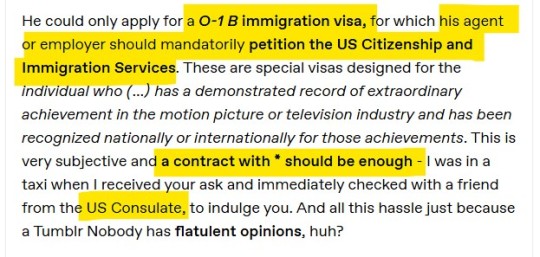

(Full October 2023 post, here: https://www.tumblr.com/sgiandubh/729979831079649280/mordor-says-he-returned-only-for-visa-reasons)
But let's suppose even a nanoshred of what you wrote could technically be correct. When you are an US citizen and you want to bring your significant other to live with you there, you basically are offered two options:
Scenario One: you want to bring your fiancé(e) to the US and get married there. You will need the K-1 visa, as anyone even remotely familiar with that reality show I mentioned knows. That doesn't exactly click with a hastily cobbled 'new American bride' he would marry until December 31 and this is why, according to the US Citizenship and Immigration Services (USCIS) own website:

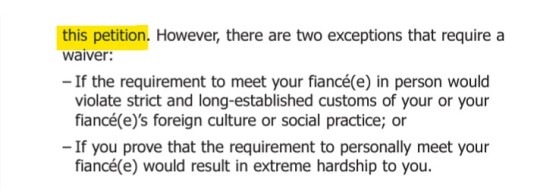
[Source, LOL: https://www.uscis.gov/sites/default/files/document/guides/A2en.pdf]
'You have met each other in person within 2 years before you file this petition'. Who is it, then? The whore? She is French. The chatty influencer? She's 'so over him' (FFS, LOL). Alice 'he's mine and will never be yours'' Panikian? If you think so, you are aff yer heid on cheap gin. Hm? Ashley Hearn? Met her too late and you all know it. A secret lover? ROFLMAO. And psst: Raya girls are just for fun, they don't think homestead. Cross my heart, Anon.
Current and official USCIS average processing time for fiancé petitions at their (logically) California Service Center is:
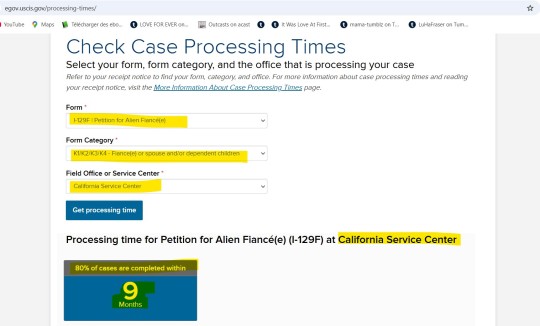
But it could be as long as 26 months and a half, if he decides to settle for a Vermont beauty (LOOOOOOOL).
You should also know a couple of other things, Anon. First thing is he will not be able to enter the US under the type of visa he currently more than probably holds, in order to do so - that would be a heavily punished immigration fraud:
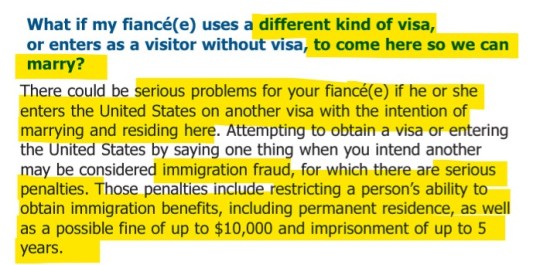
Mhm. Restrictions on his ability to future immigration benefits/permanent residence, fine and imprisonment. I hope I do not need to further develop, on this one.
Last thing you should have taken into consideration before writing this bullshit is that the fiancé visa would restrict his ability to go back to his own home country during all the waiting time. Why would an actor refuse work opportunities in the UK or in Europe for the sake of a fake marriage, as you called it yourself? Oh, if you only had a brain!
Need I say more about the grueling in-person cross-check interviews ? You should watch a wonderful movie starring Gerard Depardieu (a pig alright, but he is perfect, in there) and Andie MacDowell: it's even called Green Card, LOL. Few things changed since 1990, and if anything, the screw got only tighter. Not to mention the fact he will be unable to work in the US during the waiting process and she will have to prove she can sponsor/provide for him! ROFLMAO.
Scenario Two: you get married abroad and want to bring your spouse to the US, afterwards. You will need to file the Form I-130 (Petition for Alien Relative):
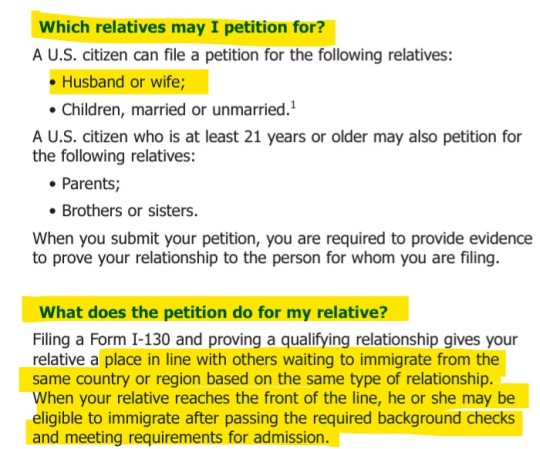
[Source: https://www.uscis.gov/sites/default/files/document/guides/A1en.pdf]
All this does, in reality, is put the spouse in line with thousands of other similar applicants. Residency will be granted only after extensive background checks and this is where I would like to stop for a while, Anon. You are with the Gay Crowd, right? Then how does this logically click with your long established talking point about his 'once very public gay life? Ah: he isn't gay? ROFLMAO. You see, being gay is a bit like being pregnant, Anon: you can't be 'just a little bit pregnant' and you certainly can't be 'just a little bit gay', either. Spare me the drivel 🙄. Kindly note those background checks are dead serious and could result in deportation - thought you should know, before you spew idiocies again.
Onwards with that residency thing:
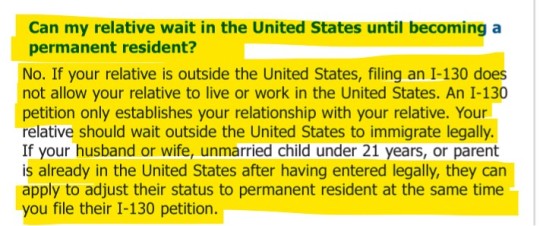
If S were in Scotland/the UK when the 'legal fake bride' would file in the petition, he would not be allowed to come visit or work in the US: why would an actor be forced to turn down lucrative opportunities in Hollywood or elsewhere in the country, for the sake of bearding or circus only? And while S could technically apply for permanent resident status if he already were in the US at the time of the application for I-130, he would still not be able to work and therefore must be sponsored by the 'legal bride'. ROFLMAO, again.
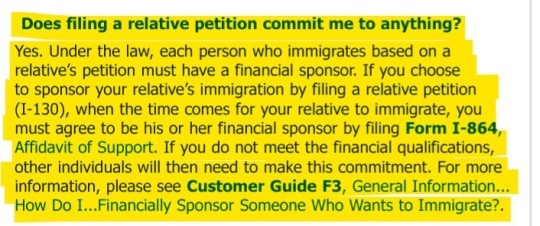
I mean, this is so ridiculous I could cry. He would be invited to come to the US only after the petition is approved, which does not click with your suggested timeline and the seeming 'emergency situation' ('he NEEDS the residency', your ask shouts at the Entire Universe) . Why the haste? Just because you wanted to somehow shoehorn it in, somewhere before Inauguration Day? I have no words, but my paunch hurts with laughing right now.
Finally let's have a look at processing current times:
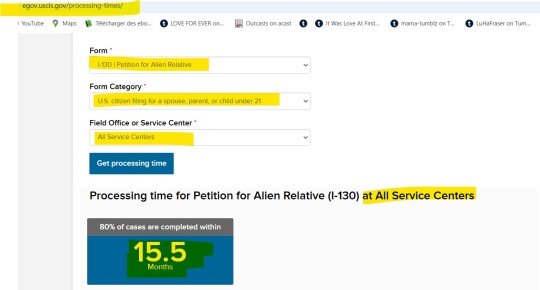
But it could go as long as...
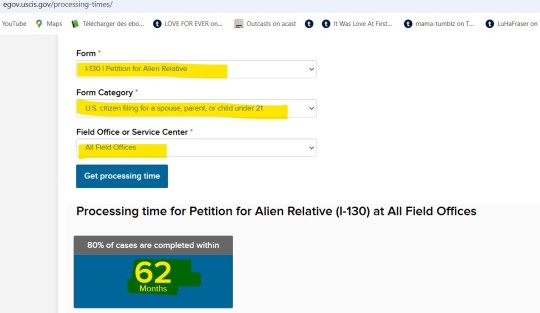
I cannot stress enough that permanent residency will be granted only after the processing time is completed.
Why, oh, why would someone so inextricably complicate his entire existence in such an idiotic fashion, Anon? And finally, give me and yourself a break and read the damn political room, here, too. I will not elaborate, but I surely hope you do not live under a rock.
I rest my case, thank you, fuck off.

86 notes
·
View notes
Note
Actually the green card discussion is easy to shut down !
You need to stay in the country for 9 months straight! The info comes from someone living between the US and Europe for 10 years and she went public explaining why it took her almost 10 years to apply for the green card! I m not naming the person but she is famous!
So the PT girl never was 9 months straight in the country! Her rare „sightings“ confirm that!
Actually, the green card discussion is real easy to shut down. You need to be physically present in the U.S. for at least 9 months out of the year—every year—to even qualify for a legit green card process (unless you’re married to someone and even then, USCIS does check for cohabitation and intent).
Funny how the “PT girl” is never seen consistently in the U.S., right? Her “appearances” are like Bigfoot sightings—blurry, rare, and almost always suspiciously timed, plus phone cameras never work when they’re spotted by the trust me bro crew,
Meanwhile, someone who actually lived between Europe and the U.S. (and is famous, btw) said it took her nearly a decade to apply because of that exact rule.

So yeah—unless teleportation is on the menu, the timeline doesn’t math.
Try harder, PR team 💅
#chris evans shitshow#chris evans pr#maths#declined immigration#deported#lies will catch up with you#desperate for attention#manipulative#fuck around and find out#fuck caa#fuck narrative pr
18 notes
·
View notes
Text
one of the things most frustrating to think about as someone who did go through the immigration system in the US is the fact that there seems to be a genuine belief by a significant portion of the populace in this country that the immigration system is a simple, straightforward process, when it most certainly is not.
for one thing, the applications to gain some form of legal status themselves are confusing af to actually read through. most of the applications uses confusing language and can be upwards of about 15-20 pages worth of documents you gotta spend time actually pouring through.
for example, currently the i-485 form (application for green card) sits at about 24 pages, and requires a couple of hours to fill out. for most immigrants who know little to no english, either they would have to sit with an english-speaking paralegal to help them, or one of their relatives who knows english would need to be the one to help them out.
the i-130 form (application for alien relatives) is about 12 pages, and just as hella confusing to go through.
the i-589 (application for asylum) and i-765 (application for worker's permit) aren't too bad in comparison, at about 7-8 pages, but even so, the legal language is still a hassle to try and understand.
(yes, I have helped both my parents fill out all these forms)
oh, and did i mention that every one of these forms cost money to file and submit to uscis for processing? this is not counting the typical immigration lawyer's fees immigrants have to fork up in order to get some decent representation, most immigrants still need to make a living one way or another, or how else are they to provide for their families and give their children a better future? (and ya know, afford the fees to try and actually go through the process of gaining legal status here???)
not only that, answering any of the questions wrong on any of these forms could be enough for uscis to reject the filing or outright deny it. and no, ofc there's no refunds on the application fees.
for a country that has a horrendous literacy crisis, i would so love to see the rest of y'all try to take a gander at these forms and see if you don't lose your goddamn mind.
have i mentioned how fucking terrifying it is when uscis officers grill you during the interview process???? because yes, there is an interview component to most of these forms. as if their questions are literally designed for you to fail???!!
this is just a few aspect of the immigration process that's so broken right now, it might as well be a 10k puzzle piece scattered in a room.
the strenuous waiting time between processing of applications, the anxiety of the elections every goddamn year because politicians cannot fucking make up their minds with how immigration ought to be tackled in this country, all the while immigrants also have to deal with the stress of everyday life and whatever challenges that brings.
uscis is still working through a backlog of applications from decades ago, and some people in this country really have the goddamn audacity to think, "they have to get here legally and go through the process that way"???!
a fucking luxury (ignorant af though, mind you) for some of y'all to say, indeed, especially if all it took back then for your family to get here was through ellis fucking island.
my aunt petitioned my dad with the i-589 form over 38 years ago when he was still living in the philippines, and mind you, the visa number from that filing was only granted and mailed to my dad's old house last year in december 2024, when we went home to visit relatives for the holidays and long after he's already become a US citizen.
i'm not asking for people to change their minds about immigration or that this country ought to let everyone in, i knowwwwww the system is broken and terrible.
but what i am asking is for people to educate themselves and to be open-minded, to not dismiss the struggles of immigrants, because those who think that the immigration process in this country is easy are hella ignorant and will never understand the sort of anxiety illegal immigrants go through, for the sake of trying to provide a better future for their children.
38 notes
·
View notes
Text
Judd Legum at Popular Information:
On March 20, Popular Information revealed that the Social Security Administration (SSA) secretly implemented a policy shift that could impose massive demands on the agency's already overburdened network of field offices. Each year, the SSA automatically issues millions of Social Security numbers and cards to non-citizens granted work authorizations as part of an agreement between the SSA and U.S. Citizenship and Immigration Services (USCIS). The agreement, known as Enumeration Beyond Entry (EBE), benefits both the work-authorized non-citizens, who receive their cards in the mail as part of the application process, and the government, which does not need to spend time and money processing separate applications for millions of Social Security numbers. In the 2024 fiscal year, there were over 3.24 million initial Employment Authorization Documents approved by USCIS. EBE was created in 2017 by the Trump administration. In the absence of the EBE program, everyone granted work authorization will be required to visit a Social Security field office to obtain a new Social Security number and card. Popular Information obtained a March 19 memorandum that the EBE program for "noncitizens granted work authorization" and "newly naturalized U.S. citizens" has been "temporarily" frozen. According to SSA sources, the freeze is still in effect. Now, the ranking member of the House Oversight Committee, Congressman Gerald E. Connolly (D-VA), has written a letter to the SSA demanding that it reverse the policy. Connolly’s letter, which was sent to Acting SSA Commissioner Leland Dudek on Tuesday, says freezing the EBE program "increases costs and decreases efficiency and potentially violates multiple federal laws."
Rep. Gerry Connolly (D-VA), who is the ranking member of the House Oversight Committee, wrote a letter demanding the Social Security Administration to reverse their ending of the Enumeration Beyond Entry that was created under the 1st Trump term in 2017.
#Social Security Administration#Enumeration Beyond Entry#Gerry Connolly#House Oversight Committee#US Citizenship and Immigration Services#USCIS#Leland Dudek
27 notes
·
View notes
Text
Embark on your journey to permanent residency in the United States! Our detailed guide demystifies the USA Green Card application process, providing essential insights on eligibility, documentation, and key steps. Maximize your chances of success with expert tips and ensure a smooth path toward obtaining your USA Green Card. Your American dream awaits – start your application with confidence!
#Green Card application process#Permanent residency USA#USA immigration steps#Green Card eligibility criteria#Application documentation requirements#Immigrant visa application#Diversity Visa Lottery program#Employment-based Green Card#Family-sponsored immigration#Green Card interview preparation#USCIS processing times#Green Card benefits#U.S. immigration pathways#Immigration attorney advice#USA Green Card success tips
2 notes
·
View notes
Text
Planning a Trip to the U.S.? Your Social Media Could Get You Banned or Detained
Thinking about traveling to the U.S.? You might want to reconsider. New immigration policies under the Trump administration are making it harder—not just for immigrants, but for tourists and business travelers as well. (Sources: The Sunday Standard, Business Standard)
What’s Changing?
Extensive Background Checks on Social Media – The government is now requiring visa applicants and immigrants to submit years’ worth of social media history for background checks. Any post deemed "un-American" or "disrespectful" toward the government could result in visa denial or even detention.
Longer Visa Processing Times – Stricter screening measures are leading to significant delays for tourists, students, and workers.
Increased Rejections & Deportations – Those flagged during the social media vetting process risk not just visa denials, but even deportation if already in the U.S.
How Does This Affect You?
Your Social Media Activity Is Under Scrutiny – If you apply for a U.S. visa, your Twitter, Instagram, Facebook, and even private messages could be examined for any sign of criticism against the government or its policies.
Speaking Out Could Get You Detained – Under Executive Order 14161, individuals who have expressed "disrespect" toward the U.S. president online can be labeled as security threats. In extreme cases, this could result in being placed in deportation proceedings or even in immigration detention.
Travel Delays & Cancellations – Tourists planning trips to the U.S. may face months-long wait times for visas, making last-minute travel nearly impossible.
Discrimination & Profiling – These policies disproportionately affect travelers from Muslim-majority countries and people of color, increasing the risk of unfair denials.
Economic Consequences – Tourism and business travel are major contributors to the U.S. economy. If visitors face too many hurdles, they might take their money elsewhere.
The Bigger Picture
These changes don’t just inconvenience travelers; they reflect a broader effort to isolate the U.S. from the world while tightening control over free speech. Policies that target immigrants today can easily expand to restrict other visitors tomorrow. If these measures continue unchecked, even those with valid reasons to visit—students, researchers, or professionals—could find themselves shut out.
Executive Order 14161 and the aggressive expansion of background checks send a clear message: dissent will not be tolerated. By monitoring and punishing individuals for their online speech, the U.S. government is moving closer to authoritarian control. Travelers, immigrants, and even citizens may find themselves self-censoring out of fear that their words could be used against them.
What Can You Do?
Be Aware – If you’re planning to travel to the U.S., prepare for increased scrutiny.
Protect Your Privacy – Be mindful of what you post online, as it could be reviewed during the visa process.
Speak Out – Governments and travel organizations should push back against policies that restrict free movement and personal privacy.
Support Digital Rights Advocacy – Groups fighting against government overreach in online surveillance need public backing.
The U.S. has long been a top destination for travelers, but these new restrictions could change that. If tourism, free speech, and international collaboration suffer, America itself will pay the price.
https://www.business-standard.com/finance/personal-finance/us-immigrants-may-soon-need-to-share-social-media-details-with-uscis-125030600619_1.html
#usa politics#us politics#politics#american politics#political#us government#trump is a threat to democracy#donald trump#travel#immigration#immigrants
13 notes
·
View notes
Text
The ZOA praises the new Department of Homeland Security (DHS) policy announced on Wednesday (April 9) that, effective immediately, “the U.S. Citizenship and Immigration Services (USCIS) will begin considering aliens’ antisemitic activity on social media and the physical harassment of Jewish individuals as grounds for denying immigration benefit requests. . . . DHS will enforce all relevant immigration laws to the maximum degree, to protect the homeland from extremists and terrorist aliens, including those who support antisemitic terrorism, violent antisemitic ideologies and antisemitic terrorist organizations such as Hamas, Palestinian Islamic Jihad, Hezbollah, or Ansar Allah aka: “the Houthis”.”
Shamefully, the next day, the Jewish Council for Public Affairs (JCPA)’s extreme left wing CEO Amy Spitalnick (who previously worked as the anti-Israel group J Street’s Press Secretary) shot off an obnoxious letter to U.S. Secretary of Homeland Security Kristi Noem, questioning and attempting to undermine the new DHS policy to protect Jewish students and the American homeland from antisemitic terrorists and terror sympathizers who have made many Jewish students’ college experience into a living hell.
Why is JCPA’s CEO protecting terrorists, Jew-haters and terror supporters?
Among other things, the radical JCPA CEO wanted to know whether the U.S. administration is also precluding entry into the United States of people engaged in “anti-Muslim prejudice.” At a time when antisemitic Islamists are attacking and calling for murdering Jews on campuses throughout the country, why in the world is the head of a Jewish organization trying to undermine DHS’s efforts, by pretending that the problem on college campuses is non-existent anti-Muslim prejudice?
Did the members of JCPA (which is an umbrella group of JCRC’s, etc.) approve of Spitalnick’s troubling letter?
The radical J Street-alumna/JCPA CEO’s questions also in essence demanded a “clear and transparent process for denial of entry” with “public reporting on the number of individuals denied entry and the reasons why” – as if antisemitic foreigners have some sort of right to enter the country. But, in fact, there is no “right” to immigrate to the United States.
As DHS Assistant Secretary for Public Affairs Tricia McLaughlin stated: “There is no room in the United States for the rest of the world’s terrorist sympathizers, and we are under no obligation to admit them or let them stay here. Sec. Noem has made it clear that anyone who thinks they can come to America and hide behind the First Amendment to advocate for anti-Semitic violence and terrorism – think again. You are not welcome here.”
It is tragic that hostile-to-Israel Jewish professionals such as JCPA’s Amy Spitalnick are abusing their podiums to try to throw up roadblocks against the Trump administration’s efforts to stop antisemites from endangering our Jewish children and fellow Americans.
#antisemitism#immigration#department of homeland security#tricia mclaughlin#jewish council for public affairs#amy spitalnick
14 notes
·
View notes
Text
Operatives from Elon Musk’s so-called Department of Government Efficiency (DOGE) are building a master database at the Department of Homeland Security (DHS) that could track and surveil undocumented immigrants, two sources with direct knowledge tell WIRED.
DOGE is knitting together immigration databases from across DHS and uploading data from outside agencies including the Social Security Administration (SSA), as well as voting records, sources say. This, experts tell WIRED, could create a system that could later be searched to identify and surveil immigrants.
The scale at which DOGE is seeking to interconnect data, including sensitive biometric data, has never been done before, raising alarms with experts who fear it may lead to disastrous privacy violations for citizens, certified foreign workers, and undocumented immigrants.
A United States Customs and Immigration Services (USCIS) data lake, or centralized repository, existed at DHS prior to DOGE that included data related to immigration cases, like requests for benefits, supporting evidence in immigration cases, and whether an application has been received and is pending, approved, or denied. Since at least mid-March, however, DOGE has been uploading mass amounts of data to this preexisting USCIS data lake, including data from the Internal Revenue Service (IRS), SSA, and voting data from Pennsylvania and Florida, two DHS sources with direct knowledge tell WIRED.
“They are trying to amass a huge amount of data,” a senior DHS official tells WIRED. “It has nothing to do with finding fraud or wasteful spending … They are already cross-referencing immigration with SSA and IRS as well as voter data.”
Since president Donald Trump’s return to the White House earlier this year, WIRED and other outlets have reported extensively on DOGE’s attempts to gain unprecedented access to government data, but until recently little has been publicly known about the purpose of such requests or how they would be processed. Reporting from The New York Times and The Washington Post has made clear that one aim is to cross-reference datasets and leverage access to sensitive SSA systems to effectively cut immigrants off from participating in the economy, which the administration hopes would force them to leave the county. The scope of DOGE’s efforts to support the Trump administration’s immigration crackdown appear to be far broader than this, though. Among other things, it seems to involve centralizing immigrant-related data from across the government to surveil, geolocate, and track targeted immigrants in near real time.
DHS and the White House did not immediately respond to requests for comment.
DOGE’s collection of personal data on immigrants around the US has dovetailed with the Trump administration’s continued immigration crackdown. “Our administration will not rest until every single violent illegal alien is removed from our country,” Karoline Leavitt, White House press secretary, said in a press conference on Tuesday.
On Thursday, Gerald Connolly, a Democrat from Virginia and ranking member on the House Oversight Committee, sent a letter to the SSA office of the inspector general stating that representatives have spoken with an agency whistleblower who has warned them that DOGE was building a “master database” containing SSA, IRS, and HHS data.
“The committee is in possession of multiple verifiable reports showing that DOGE has exfiltrated sensitive government data across agencies for unknown purposes,” a senior oversight committee aide claims to WIRED. “Also concerning, a pattern of technical malfeasance has emerged, showing these DOGE staffers are not abiding by our nation’s privacy and cybersecurity laws and their actions are more in line with tactics used by adversaries waging an attack on US government systems. They are using excessive and unprecedented system access to intentionally cover their tracks and avoid oversight so they can creep on Americans’ data from the shadows.”
“There's a reason these systems are siloed,” says Victoria Noble, a staff attorney at the Electronic Frontier Foundation. “When you put all of an agency's data into a central repository that everyone within an agency or even other agencies can access, you end up dramatically increasing the risk that this information will be accessed by people who don't need it and are using it for improper reasons or repressive goals, to weaponize the information, use it against people they dislike, dissidents, surveil immigrants or other groups.”
One of DOGE’s primary hurdles to creating a searchable data lake has been obtaining access to agency data. Even within an agency like DHS, there are several disparate pools of data across ICE, USCIS, Customs and Border Protection, and Homeland Security Investigations (HSI). Though some access is shared, particularly for law enforcement purposes, these pools have not historically been commingled by default because the data is only meant to be used for specific purposes, experts tell WIRED. ICE and HSI, for instance, are law enforcement bodies and sometimes need court orders to access an individual's information for criminal investigations, whereas USCIS collects sensitive information as part of the regular course of issuing visas and green cards.
DOGE operatives Edward Coristine, Kyle Schutt, Aram Moghaddassi, and Payton Rehling have already been granted access to systems at USCIS, FedScoop reported earlier this month. The USCIS databases contain information on refugees and asylum seekers and possibly data on green card holders, naturalized US citizens, and Deferred Action for Childhood Arrivals recipients, a DHS source familiar tells WIRED.
DOGE wants to upload information to the data lake from myUSCIS, the online portal where immigrants can file petitions, communicate with USCIS, view their application history, and respond to requests for evidence supporting their case, two DHS sources with direct knowledge tell WIRED. In combination with IP address information from immigrants that sources tell WIRED that DOGE also wants, this data could be used to aid in geolocating undocumented immigrants, experts say.
Voting data, at least from Pennsylvania and Florida, appears to also have also been uploaded to the USCIS data lake. In the case of Pennsylvania, two DHS sources tell WIRED that it is being joined with biometric data from USCIS’s Customer Profile Management System, identified on the DHS’s website as a “person-centric repository of biometric and associated biographic information provided by applicants, petitioners, requestors, and beneficiaries” who have been “issued a secure card or travel document identifying the receipt of an immigration benefit.”
“DHS, for good reason, has always been very careful about sharing data,” says a former DHS staff member who spoke to WIRED on the condition of anonymity because they were not authorized to speak to the press. “Seeing this change is very jarring. The systemization of it all is what gets scary, in my opinion, because it could allow the government to go after real or perceived enemies or ‘aliens; ‘enemy aliens.’”
While government agencies frequently share data, this process is documented and limited to specific purposes, according to experts. Still, the consolidation appears to have administration buy-in: On March 20, President Trump signed an executive order requiring all federal agencies to facilitate “both the intra- and inter-agency sharing and consolidation of unclassified agency records.” DOGE officials and Trump administration agency leaders have also suggested centralizing all government data into one single repository. “As you think about the future of AI, in order to think about using any of these tools at scale, we gotta get our data in one place," General Services Administration acting administrator Stephen Ehikian said in a town hall meeting on March 20. In an interview with Fox News in March, Airbnb cofounder and DOGE member Joe Gebbia asserted that this kind of data sharing would create an “Apple-like store experience” of government services.
According to the former staffer, it was historically “extremely hard” to get access to data that DHS already owned across its different departments. A combined data lake would “represent significant departure in data norms and policies.” But, they say, “it’s easier to do this with data that DHS controls” than to try to combine it with sensitive data from other agencies, because accessing data from other agencies can have even more barriers.
That hasn’t stopped DOGE operatives from spending the last few months requesting access to immigration information that was, until recently, siloed across different government agencies. According to documents filed in the American Federation of State, County and Municipal Employees, AFL-CIO v. Social Security Administration lawsuit on March 15, members of DOGE who were stationed at SSA requested access to the USCIS database, SAVE, a system for local and state governments, as well as the federal government, to verify a person’s immigration status.
According to two DHS sources with direct knowledge, the SSA data was uploaded to the USCIS system on March 24, only nine days after DOGE received access to SSA’s sensitive government data systems. An SSA source tells WIRED that the types of information are consistent with the agency's Numident database, which is the file of information contained in a social security number application. The Numident record would include a person’s social security number, full names, birthdates, citizenship, race, ethnicity, sex, mother’s maiden name, an alien number, and more.
Oversight for the protection of this data also appears to now be more limited. In March, DHS announced cuts to the Office for Civil Rights and Civil Liberties (CRCL), the Office of the Immigration Detention Ombudsman, and the Office of the Citizenship and Immigration Services Ombudsman, all key offices that were significant guards against misuse of data. “We didn't make a move in the data world without talking to the CRCL,” says the former DHS employee.
CRCL, which investigates possible rights abuses by DHS and whose creation was mandated by Congress, had been a particular target of DOGE. According to ProPublica, in a February meeting with the CRCL team, Schutt said, “This whole program sounds like money laundering.”
Schutt did not immediately respond to a request for comment.
Musk loyalists and DOGE operatives have spoken at length about parsing government data to find instances of supposed illegal immigration. Antonio Gracias, who according to Politico is leading DOGE’s “immigration task force,” told Fox and Friends that DOGE was looking at voter data as it relates to undocumented immigrants. “Just because we were curious, we then looked to see if they were on the voter rolls,” he said. “And we found in a handful of cooperative states that there were thousands of them on the voter rolls and that many of them had voted.” (Very few noncitizens voted in the 2024 election, and naturalized immigrants were more likely to vote Republican.) Gracias is also part of the DOGE team at SSA and founded the investment firm Valor Equity Partners. He also worked with Musk for many years at Tesla and helped the centibillionaire take the company public.
“As part of their fixation on this conspiracy theory that undocumented people are voting, they're also pulling in tens of thousands, millions of US citizens who did nothing more than vote or file for Social Security benefits,” Cody Venzke, a senior policy counsel at the American Civil Liberties Union focused on privacy and surveillance, tells WIRED. “It's a massive dragnet that's going to have all sorts of downstream consequences for not just undocumented people but US citizens and people who are entitled to be here as well.”
Over the past few weeks, DOGE leadership within the IRS have orchestrated a “hackathon” aimed at plotting out a “mega API” allowing privileged users to view all agency data from a central access point. Sources tell WIRED the project will likely be hosted on Foundry, software developed by Palantir, a company cofounded by Musk ally and billionaire tech investor Peter Thiel. An API is an application programming interface that allows different software systems to exchange data. While the Treasury Department has denied the existence of a contract for this work, IRS engineers were invited to another three-day “training and building session” on the project located at Palantir’s Georgetown offices in Washington, DC, this week, according to a document viewed by WIRED.
“Building it out as a series of APIs they can connect to is more feasible and quicker than putting all the data in a single place, which is probably what they really want,” one SSA source tells WIRED.
On April 5, DHS struck an agreement with the IRS to use tax data to search for more than seven million migrants working and living in the US. ICE has also recently paid Palantir millions of dollars to update and modify an ICE database focused on tracking down immigrants, 404 Media reported.
Multiple current and former government IT sources tell WIRED that it would be easy to connect the IRS’s Palantir system with the ICE system at DHS, allowing users to query data from both systems simultaneously. A system like the one being created at the IRS with Palantir could enable near-instantaneous access to tax information for use by DHS and immigration enforcement. It could also be leveraged to share and query data from different agencies as well, including immigration data from DHS. Other DHS sub-agencies, like USCIS, use Databricks software to organize and search its data, but these could be connected to outside Foundry instances simply as well, experts say. Last month, Palantir and Databricks struck a deal making the two software platforms more interoperable.
“I think it's hard to overstate what a significant departure this is and the reshaping of longstanding norms and expectations that people have about what the government does with their data,” says Elizabeth Laird, director of equity in civic technology at the Center for Democracy and Technology, who noted that agencies trying to match different datasets can also lead to errors. “You have false positives and you have false negatives. But in this case, you know, a false positive where you're saying someone should be targeted for deportation.”
Mistakes in the context of immigration can have devastating consequences: In March, authorities arrested and deported Kilmar Abrego Garcia, a Salvadoran national, due to, the Trump administration says, “an administrative error.” Still, the administration has refused to bring Abrego Garcia back, defying a Supreme Court ruling.
“The ultimate concern is a panopticon of a single federal database with everything that the government knows about every single person in this country,” Venzke says. “What we are seeing is likely the first step in creating that centralized dossier on everyone in this country.”
9 notes
·
View notes
Text
K-2 and K-4 Visas
The K-2 and K-4 visas are non-immigrant visa categories that allow eligible children of U.S. fiancé(e) or spouse visa applicants to enter the United States and accompany their parent pending adjustment of status to lawful permanent resident (Green Card holder). These visa types are critical components of family unification under U.S. immigration law, offering minor children lawful admission rights linked to their parent’s K-1 (fiancé(e)) or K-3 (spouse) visa application.
For Thai nationals, understanding the nuanced legal framework and procedural requirements behind the K-2 and K-4 visa processes is essential, especially when navigating consular processing at the U.S. Embassy in Bangkok or the U.S. Consulate General in Chiang Mai.
This article provides a comprehensive, legal, and procedural analysis of the K-2 and K-4 visa pathways from Thailand, highlighting eligibility rules, documentary requirements, application steps, and strategic pitfalls to avoid.
1. Legal Basis and U.S. Immigration Framework
1.1 Governing Laws
Immigration and Nationality Act (INA) § 101(a)(15)(K): Defines K visa classifications
8 CFR § 214.2(k): Regulatory guidance for K-2 and K-4 visa procedures
Department of State Foreign Affairs Manual (FAM): Consular officer guidelines for adjudicating K visas
1.2 Purpose of K-2 and K-4 Visas
K-2 Visa: For unmarried children under 21 years old of a K-1 fiancé(e) visa holder.
K-4 Visa: For unmarried children under 21 years old of a K-3 spouse visa holder.
Both allow children to travel to the U.S. alongside or after the principal visa holder and apply for adjustment of status to become lawful permanent residents once the parent marries (in K-1 cases) or completes immigrant visa processing (in K-3 cases).
Important: Stepchildren of U.S. citizens applying for K-4 visas must establish that the marriage between the U.S. citizen and the foreign spouse occurred before the child's 18th birthday under U.S. immigration law.
2. Procedural Steps for Thai Applicants
3.1 K-2 Visa Linked to K-1 Parent (Fiancé(e))
Form I-129F Petition: U.S. citizen fiancé(e) must list child(ren) on the petition.
USCIS Approval: Petition sent to the National Visa Center (NVC) for processing.
Consular Processing:
Apply separately for each K-2 child through DS-160 forms.
Schedule a visa interview at the U.S. Embassy Bangkok or U.S. Consulate Chiang Mai.
Medical Exam: Conducted at an approved clinic.
Interview and Visa Issuance:
Child’s eligibility is separately assessed.
Parent and child may be interviewed together or separately.
Entry into the U.S.: Child enters with K-2 visa.
Adjustment of Status: File Form I-485 after parent's marriage to U.S. citizen within 90 days.
2.2 K-4 Visa Linked to K-3 Parent (Spouse)
Form I-130 and Form I-129F Petitions: U.S. citizen files both petitions for the foreign spouse.
K-3 Approval: Visa processing through NVC.
K-4 Visa Application:
No separate petition required for child if marriage occurred before the child’s 18th birthday.
Complete DS-160 application.
Medical Exam and Interview.
Entry into the U.S.: K-4 child accompanies parent.
Adjustment of Status: File Form I-485 once the immigrant petition (I-130) is approved.
Thai birth certificates and legal documents must be translated into English and certified.
3. Important Legal and Practical Considerations
3.1 Age-Out Risks
A child must enter the U.S. while still under 21 years of age.
The Child Status Protection Act (CSPA) may offer limited protection by "freezing" the child's age, but K-2/K-4 beneficiaries must generally act quickly.
3.2 Adjustment of Status Timing
K-2 child must apply for adjustment of status after the principal K-1 holder marries the U.S. citizen.
K-4 child must adjust status after the approval of the immigrant petition (I-130).
3.3 Separate Applications
Children must file separate Form I-485s when adjusting status—there is no automatic derivation based on parent’s adjustment.
3.4 Work and Travel Authorization
K-2 and K-4 visa holders may apply for:
Employment Authorization Document (EAD) by filing Form I-765.
Advance Parole for travel outside the U.S. while the adjustment application is pending.
4. Consular Processing at U.S. Embassy Bangkok / Consulate Chiang Mai
High scrutiny of family relationship authenticity.
Officers may require original birth certificates, proof of continuous relationship, and even school records.
K-2 and K-4 children must be prepared for basic questions at interviews about:
Family circumstances
Relationship to U.S. sponsor
Intent to reside in the U.S. with parent
Costs for biometrics, translations, and courier services are additional.
5. Conclusion
The K-2 and K-4 visas offer essential immigration pathways for minor children to reunite with their parents in the United States under the family-based immigration system. However, they require careful coordination between the K-1/K-3 process, Thai document standards, and U.S. immigration timelines, especially given the strict age and marital status restrictions.
For Thai applicants, successful outcomes depend on meticulous documentary preparation, attention to procedural deadlines, and a clear understanding of the parent-child relationship requirements. Failure to align the timelines correctly or prepare adequate documentation can result in severe setbacks, including visa refusal or aging out of eligibility.
3 notes
·
View notes
Note
Mordor says He returned only for Visa reasons. They did some math and understood that Sam had been there for almost 90 days, só It was time for a quick walk home.
Dear Visa Anon,
Which Mordor luminary came with this idea? The MENSA-level CRT Clique or Miss Marple, who thinks I know nothing (the Dimwit from Madrid is still learning how to spell, so I can't believe it's her)?
Regardless. These people should immediately stop watching Ninety-Day Fiancé on their cable network, following a severe overdose on Uzbek midgets and Egyptian gigolos 'looking for true love' stories.
Maybe they could also have checked their facts before solemnly stating bullshit, since they clearly think all the visitors to the wonderful U S of A are tourists and as such, entitled to a maximum 90-day stay at a time (and then a short hike to Tijuana or Canada and back on tracks: not EDI/GLA, FFS!).
Incidentally, may I remind these geniuses that S has been spotted only near EDI, which of course would mean for them he'd be getting his visa there. Unless...

Unless you know the US General Consulate in EDI does not issue any type of visas - LOL, idiots. And unless he'd need to be in LHR for the pre-appointed interview and then another 7 working days delay for processing and 1-3 working days for passport delivery by mail only (never in person, chickadees). Doesn't really click with timelines, Madam Expert.
Because they are all very intelligent, they also forgot everything about/never bothered to look for the new-ish ESTA system (https://www.handyvisas.com/esta-us-visa/british/), especially designed for Visa Waiver countries' citizens. So I insist: if traveling as a tourist, S does not need a visa to enter the US for up to 90 days - that is correct, but by no means applicable to S's reality. And if he knew he'd need to stay more than 90 days, he would have applied for a visa - mandatory - in London before the Summer of Sassenach tour.
But he is not traveling as a tourist and very probably not under another type of non-immigrant visa, simply because he has businesses there and he is also involved in the OL project with *** (d'oh!).
Let's unpack:
As per US current regulations, S cannot apply for a B-1 (business non immigrant visa). To understand why, kindly refer to the US Customs and Border Protection FAQ (https://www.cbp.gov/sites/default/files/documents/B-1%20permissible%20activities.pdf). I already munched it up for you:


He could only apply for a O-1 B immigration visa, for which his agent or employer should mandatorily petition the US Citizenship and Immigration Services. These are special visas designed for the individual who (...) has a demonstrated record of extraordinary achievement in the motion picture or television industry and has been recognized nationally or internationally for those achievements. This is very subjective and a contract with * should be enough - I was in a taxi when I received your ask and immediately checked with a friend from the US Consulate, to indulge you. And all this hassle just because a Tumblr Nobody has flatulent opinions, huh?
According to the USCIS's own regulations, not Dutch fantasy or Belfast sagas, the authorized period of stay and possibility of extension are as follows (https://www.uscis.gov/working-in-the-united-states/temporary-workers/o-1-visa-individuals-with-extraordinary-ability-or-achievement):
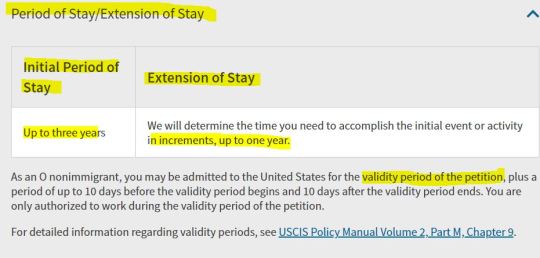
The good thing about getting this visa (and I think * sorted it out a long time ago for both of them) is that it helps tremendously with the Green Card procedures, something I bet the farm both S & C already have, by now.
So doing the maths was perfectly inane and useless.
Does that answer your question, clever Anon? Can I go back to the Quaich post I must finish (it will be VERY long, beware) today?
Thanks for asking and I am sorry for the length: this fandom being paranoid, I had to include all the tedious details. I hope we can put this idiocy to rest, now. Parochial twits.
108 notes
·
View notes
Note
If we could just have proof of her not being able to enter the US.... (im also surprised thier teams didnt go for the married but live seperatly kick thats apprently popular)
But I will say this, not that I want their teams to five this to us b/c every time we say we didn't get x, they give it to us, Most actors would want to come to the USA bc of Hollywood, Atlanta, and even NYC, look at Ana de Armas came here not knowing English.
A green card, while a lengthy process especially now, is a good thing to have. But you can be going back and forth in and out of the country. In her case, she isn't even here if she isn't working. While that's good for the U.S. as we don't need any more racists/antisemitics/Nazis
If it was real she would be stupid not to get a green card or some sort of visa to be around her husband. But if it was fake she can't do that cause it would ruin her chances of ever getting one cause you cant lie on those forms and they do, do backround checks. While I don't think she is bright AT ALL, I dont think she is stuoid enouhj to land her ass in jail ovee a gake marriage being used while trying to get a green card. OR it coudlve happened I mean that would be one reason she can't be in the US.
Anon, you basically laid it out yourself and I agree — the immigration part is very telling. Most actors, especially up-and-comers or non-Americans, want to be in the U.S. — not just for work, but for visibility, networking, branding, etc. Atlanta, NYC, L.A. — all industry hubs. Even actors who don’t speak English (like Ana de Armas when she arrived) hustle hard to be here legally because Hollywood is the dream.
So for someone supposedly married to an A-list American actor, it’s… odd. No green card? No visa update? Barely ever here unless it’s for work or she’s being strategically papped? That’s not giving “married life” — it’s giving “something doesn’t add up.”

And yeah, you’re right: if it was fake, she’d have to be really careful. You cannot lie on green card forms — USCIS does background checks, monitors travel, even interviews. If it ever came out the marriage was for PR or career gain, she’s not just getting denied — she’s risking a permanent ban or worse. Jail isn’t off the table in those cases. And while I don’t think she’s a genius, I also don’t think she’s dumb enough to go that far and risk her future unless she was promised protection.
Also, yeah — where’s the usual “married but living apart for careers” excuse? It’s PR 101. If it was real, the team would be pushing that narrative hard. The silence is louder than any press release.
So either:
1. She can’t be here, and they’re avoiding legal risks.
2. Or it was attempted, and something went sideways (visa denial, investigation, etc.).
Either way? Not normal. Not married-life normal.

#chris evans pr#chris evans shitshow#lying to a government department#fake marriage#deported#declined immigration#fuck around and find out#prison time#fuck caa#fuck narrative pr
10 notes
·
View notes